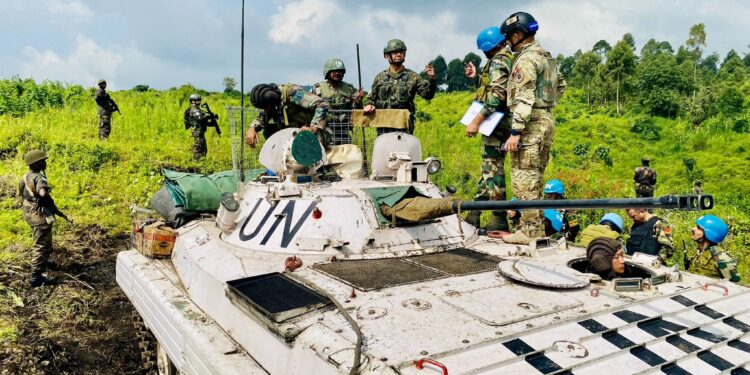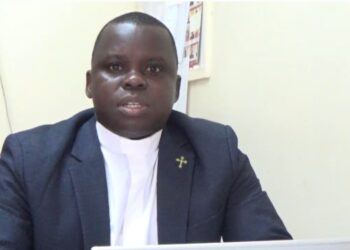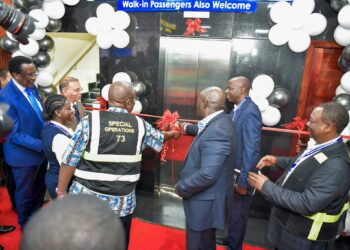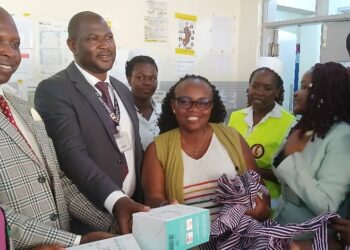The United Nations peacekeeping mission in the Democratic Republic of Congo (DRC) has revealed a December – 2024 deadline for its complete withdrawal from the Central African nation.
The mission, known as United Nations Organization Stabilization Mission in the Democratic Republic of the Congo (MONUSCO), played a pivotal role in combating rebels for over two decades, but the Congolese government’s recent request for their departure signals the end of a chapter.
The withdrawal process, outlined in a three-phased plan, will commence in the South Kivu province. By the end of April, approximately 2,000 security personnel are set to leave in the initial phase, with subsequent phases involving the withdrawal of forces from the North Kivu and Ituri provinces.
Bintou Keita, the head of MONUSCO, emphasized that the mission’s departure signifies the culmination of 25 years of presence in the DRC.
Speaking at a media briefing in the Congolese capital of Kinshasa, Keita reassured that the conclusion of MONUSCO’s mission does not mark the end of the United Nations’ involvement in the country.
There is a commitment to a progressive and responsible withdrawal, according to a disengagement plan jointly developed by the U.N. and Congolese officials.
Congolese Foreign Minister Christophe Lutundula highlighted the collaborative efforts in establishing modalities for the gradual transfer of tasks from MONUSCO to the Congolese government. This aims to ensure a smooth transition as the country takes on more responsibility for its security and stability.
The roots of the decision lie in the frustration of Congolese citizens who feel unprotected from rebel attacks, sparking protests against not only the U.N. mission but also others involved in the region. The situation has, at times, turned deadly, reflecting the longstanding struggle in eastern Congo.
The region has been plagued by over 120 armed groups vying for control of its resources, particularly gold, while seeking to protect their communities.
Some of these groups receive clandestine support from Congo’s neighbors, contributing to the persistent violence that has resulted in mass killings and displaced nearly 7 million people.
The Congolese government, recently reelected in a disputed vote, asserted that the security collaboration had reached its limits in a context of permanent war, without achieving the long-awaited peace in eastern Congo.
In tandem with the U.N. withdrawal, the government has also directed an East African regional force, deployed last year to aid in ending the conflict, to leave for similar reasons.
As the clock ticks towards the December deadline, the international community observes with anticipation the unfolding events in the DRC, hoping for a stable and secure future for the long-suffering region.
The Evolution of UN Peacekeeping in the Democratic Republic of Congo
The United Nations’ involvement in the Democratic Republic of Congo (DRC) spans decades, marked by complex conflicts, political transitions, and the pursuit of stability. The journey of the UN mission, initially known as MONUC and later MONUSCO, reflects the intricate dynamics of the region.
The tumultuous period began in 1996 when the First Congo War unfolded. Rwanda and Uganda, supporting Laurent Désiré Kabila, defeated President Mobutu Sese Seko. Kabila assumed the presidency in May 1997, setting the stage for subsequent conflicts.
The Second Congo War (1998-1999) witnessed a multifaceted struggle involving the DRC, Angola, and Zimbabwe against Rwanda and Uganda. Local armed groups proliferated, leading to the signing of the Lusaka Agreement in 1998, a pivotal step toward the withdrawal of foreign forces.
In August 1999, Resolution 1258 authorized the deployment of UN military liaison personnel, laying the groundwork for what would become the United Nations Organization Mission in the Democratic Republic of the Congo (MONUC) in November 1999.
This mission operated as an observation mission during the Third Congo War (1999-2003), a conflict involving various rebel groups and the Congolese government.
The assassination of Laurent D. Kabila in January 2001 saw his son Joseph taking over. The Sun City agreements were signed in April 2002, attempting to bring stability to the region. However, the situation remained volatile, prompting the deployment of Operation Artemis by the EU in Bunia in June 2003.
The years that followed were marked by further challenges. Laurent Nkunda’s forces took over Bukavu in June 2004, and the EU deployed the European Force in the DRC (EUFOR RDCongo) in June 2006 to assist MONUC during elections in Kinshasa.
The first democratic elections since 1965 took place in December 2006, leading to Joseph Kabila’s election. Subsequent years saw the rise of rebel groups, including the National Congress for the Defence of the People (CNDP), and the signing of various agreements between the Congolese government, rebel groups, and neighboring countries.
In May-July 2010, MONUC transformed into the United Nations Organization Stabilization Mission in the Democratic Republic of the Congo (MONUSCO), expanding its mandate to include a greater stabilization component. However, allegations of widespread fraud marred the presidential elections in November-December 2010.
The emergence of the M23 in April 2012 and the fall of Goma to the rebel group in November 2012 added new challenges. The Peace, Security, and Cooperation Framework (PSCF) was signed in February 2013, leading to the creation of MONUSCO’s Force Intervention Brigade (FIB) in March 2013. The military defeat of the M23 in November 2013 marked a significant milestone.
Subsequent years saw political unrest, anti-FDLR operations, and a crisis in the Kasai region. President Kabila’s decision not to seek reelection in August 2018 and the subsequent presidential elections in December 2018 ushered in a new era, culminating in the inauguration of Felix Tshisekedi as the new president of the DRC in January 2019.
The story of the UN mission in Congo is one of adaptation, resilience, and continuous efforts to navigate the complex web of conflicts in the pursuit of lasting peace and stability in the region.
Do you have a story in your community or an opinion to share with us: Email us at editorial@watchdoguganda.com














